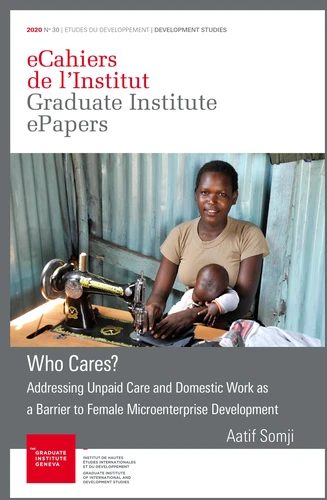Who Cares?. Addressing Unpaid Care and Domestic Work as a Barrier to Female Microenterprise Development
Par :Formats :
Disponible dans votre compte client Decitre ou Furet du Nord dès validation de votre commande. Le format Multi-format est :
- Pour les liseuses autres que Vivlio, vous devez utiliser le logiciel Adobe Digital Edition. Non compatible avec la lecture sur les liseuses Kindle, Remarkable et Sony
 , qui est-ce ?
, qui est-ce ?Notre partenaire de plateforme de lecture numérique où vous retrouverez l'ensemble de vos ebooks gratuitement
Pour en savoir plus sur nos ebooks, consultez notre aide en ligne ici
- FormatMulti-format
- ISBN978-2-940600-18-2
- EAN9782940600182
- Date de parution28/08/2020
- Protection num.NC
- Infos supplémentairesMulti-format incluant PDF avec W...
- ÉditeurGraduate Institute Publications
Résumé
Gender gaps present themselves in a number of different ways across labour markets, consistently to the detriment of females. Gender gaps are well documented in the returns to capital of microenterprises, which provide substantial employment opportunities for those in low- and middle-income countries. The puzzle for academics and policymakers concerned with issues of gender, labour and development is to understand why these gender gaps exist across microenterprises and what can be done to address them.
This ePaper seeks to contribute to these academic and policy debates, using a feminist framework to explore unpaid care and domestic work as one potential explanatory factor. Analyses of primary data collected from women micro-entrepreneurs in Uganda suggest that unpaid care and domestic work is a significant constraint to female microenterprise development. The key implication of this finding is that gender gaps in microenterprise could potentially be narrowed by addressing gender inequality in unpaid work.
This requires investing in social and physical infrastructure to reduce the total time spent on unpaid work, and addressing the social norms around its gendered distribution - redistributing unpaid work more equitably between males and females. We extend our heartfelt thanks to the Vahabzadeh Foundation for financially supporting the publication of best works by young researchers of the Graduate Institute, giving a priority to those who have been awarded academic prizes for their master's dissertations.
This ePaper seeks to contribute to these academic and policy debates, using a feminist framework to explore unpaid care and domestic work as one potential explanatory factor. Analyses of primary data collected from women micro-entrepreneurs in Uganda suggest that unpaid care and domestic work is a significant constraint to female microenterprise development. The key implication of this finding is that gender gaps in microenterprise could potentially be narrowed by addressing gender inequality in unpaid work.
This requires investing in social and physical infrastructure to reduce the total time spent on unpaid work, and addressing the social norms around its gendered distribution - redistributing unpaid work more equitably between males and females. We extend our heartfelt thanks to the Vahabzadeh Foundation for financially supporting the publication of best works by young researchers of the Graduate Institute, giving a priority to those who have been awarded academic prizes for their master's dissertations.
Gender gaps present themselves in a number of different ways across labour markets, consistently to the detriment of females. Gender gaps are well documented in the returns to capital of microenterprises, which provide substantial employment opportunities for those in low- and middle-income countries. The puzzle for academics and policymakers concerned with issues of gender, labour and development is to understand why these gender gaps exist across microenterprises and what can be done to address them.
This ePaper seeks to contribute to these academic and policy debates, using a feminist framework to explore unpaid care and domestic work as one potential explanatory factor. Analyses of primary data collected from women micro-entrepreneurs in Uganda suggest that unpaid care and domestic work is a significant constraint to female microenterprise development. The key implication of this finding is that gender gaps in microenterprise could potentially be narrowed by addressing gender inequality in unpaid work.
This requires investing in social and physical infrastructure to reduce the total time spent on unpaid work, and addressing the social norms around its gendered distribution - redistributing unpaid work more equitably between males and females. We extend our heartfelt thanks to the Vahabzadeh Foundation for financially supporting the publication of best works by young researchers of the Graduate Institute, giving a priority to those who have been awarded academic prizes for their master's dissertations.
This ePaper seeks to contribute to these academic and policy debates, using a feminist framework to explore unpaid care and domestic work as one potential explanatory factor. Analyses of primary data collected from women micro-entrepreneurs in Uganda suggest that unpaid care and domestic work is a significant constraint to female microenterprise development. The key implication of this finding is that gender gaps in microenterprise could potentially be narrowed by addressing gender inequality in unpaid work.
This requires investing in social and physical infrastructure to reduce the total time spent on unpaid work, and addressing the social norms around its gendered distribution - redistributing unpaid work more equitably between males and females. We extend our heartfelt thanks to the Vahabzadeh Foundation for financially supporting the publication of best works by young researchers of the Graduate Institute, giving a priority to those who have been awarded academic prizes for their master's dissertations.



